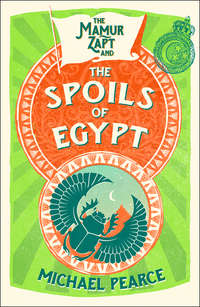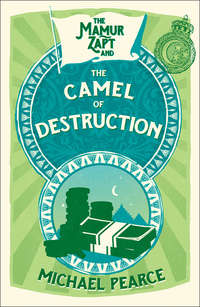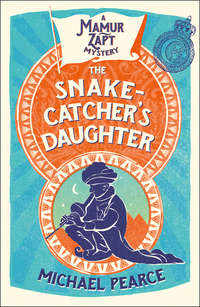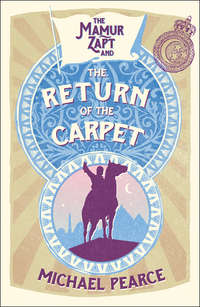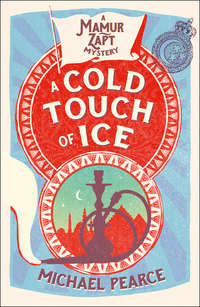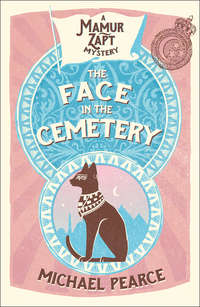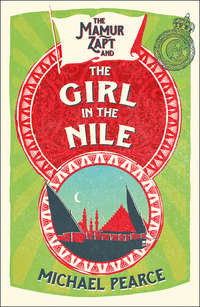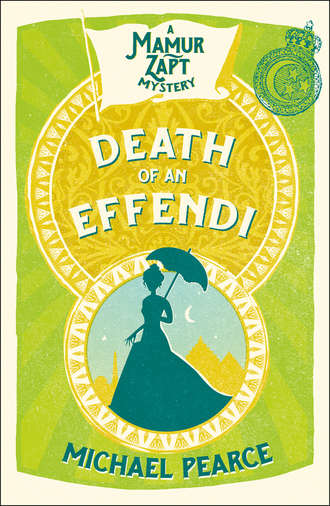
Полная версия
Death of an Effendi
Owen got into his basket. At once the water seemed to rush in.
‘All right,’ said the boatman, grinning. ‘Not sink.’
For a moment Owen was not so sure about that; nor about the general stability of the craft. It rocked crazily and he grabbed at the plaited gunwales on either side. Then the boat settled. He found himself sitting in water. After the first shock it was not disagreeable: pleasantly warm, almost languorous – sensuous, even. He settled the gun between his knees.
Then he remembered and cursed. He felt down into his pocket. Never mind that gun, it was the other one that mattered. He pulled it out, dried it against his tunic and then stuck it into his breast pocket.
His boatman gaped.
‘This one,’ he said, tapping the gun between Owen’s knees. He pointed to the small arm. ‘No need,’ he said, shaking his head.
‘I hope you’re right,’ said Owen. It hadn’t felt very wet. He hoped the chamber had not been affected.
The boatman pushed the boat out and then got in. He began to paddle.
In the other boats the boatmen stood up and poled their craft along. This close to the shore the water was very shallow and the trick was not to get out but to get in, among the reeds. This was where the basket boats had the advantage. The other boats had to hold themselves out on the edge of the reeds. The basket boats could go right in.
The boatman pushed the reeds aside with his paddle and edged through. Tvardovsky’s boat was just ahead of them.
‘You stay close to that,’ Owen directed.
The boatman nodded.
The reeds had closed all around them so that it was as if they were in a little enclave of their own. All they could see was the sky, which was, of course, all that they needed to see.
They settled down to wait. While they had been paddling out there the darkness had cleared and the sun was just coming up over the top of the reeds, a great ball of red.
The reeds were very still. But then, as the sun came up and the warmth began to touch the water, there were little rustles of movement. The lake was waking up.
The boatman reached forward and touched the gun.
Owen shook his head.
The boatman mimicked putting it to his shoulder and firing.
‘He doesn’t like shooting,’ said Owen in Arabic, jerking his head in Tvardovsky’s direction. ‘He just wants to watch.’
The boatman shrugged, accepting.
Tvardovsky sat sombrely in his boat, a little apart from Owen. Owen tried to catch his eye but Tvardovsky was staring into the reeds.
Suddenly there was a loud report and then from all along the shore, birds flew up into the sky. For a moment all was confusion as the birds scattered and squawked but then there were more reports and suddenly, from over to their right, the ducks came flying. They came with almost unbelievable speed, heading right across their front and out towards the centre of the lake.
At once, raggedly, almost in panic, the shooting started. From somewhere very near them, just beyond the reeds, a veritable barrage opened up.
Tvardovsky put his hands over his ears. The noise was deafening.
The fusillade seemed to have no effect on the ducks. They just flew on and on, an endless number of them.
But then suddenly they were gone. The shooting died away. The lake returned to its quietness. It was as if nothing had happened; only now, here and there among the reeds, Owen saw bunches of feathers and in the water the occasional floating spot of red.
The boatman gave an exclamation and then paddled the boat swiftly to one side. He poked the reeds apart with his paddle, reached out and lifted a bird, hanging limply, into the boat. He paused for a second, eyes searching the reeds and then drove the boat on again, just a few yards. Another bird was handed into the boat.
And then, surprisingly, two last birds came in towards them.
‘Effendi, Effendi!’
The boatman thrust the gun into Owen’s hands.
Almost without thinking, Owen put the gun to his shoulder and fired.
The birds swooped on and he thought for a moment that he had missed. Then first one and then the other seemed to check in mid flight and fall like stones.
The boatman whooped with delight and hurried the boat to where they had fallen and Owen was pleased, too, exhilarated. He had not meant to take part but then it had all happened so quickly, and he had not been able to resist.
The boatman retrieved the birds and showed them to Owen, smiling. Then he stowed them away with the other birds.
‘Hotel?’ he said, picking up the paddle.
‘Tvardovsky,’ said Owen, looking around him. ‘Where’s Tvardovsky?’
Everywhere were reeds. There was no sight of Tvardovsky.
‘The other boat,’ said Owen. ‘I need to find the other boat!’
The boatman shrugged but then reluctantly began to paddle back in roughly the direction they had come. Only, among the reeds, the direction was no longer clear. In this part of the lake they reached to head-high and grew so thickly that you could not see more than a yard or two in any direction.
‘Tvardovsky!’ Owen called. ‘Where are you?’
But there was no reply.
‘Ahmed!’ called the boatman. ‘Ahmed!’
From somewhere further off they could hear the sounds of the other boats returning, the delighted chatter of the sportsmen.
And then, floating out from behind the reeds, dyeing the water, came a little trail of red; not from a bird this time.
2
Reactions afterwards were strangely muted. His Highness had, fortunately, departed the previous evening. His office issued a statement of regret on his behalf but otherwise seemed surprisingly unconcerned.
‘As long as it’s kept out of the newspapers,’ they said offhandedly.
The Russians took a similar view.
‘These things happen,’ the Russian Consul said philosophically, ‘especially at shooting parties.’
The party itself dispersed after breakfast – a good, solid breakfast for the hunters, with grapefruit fresh from the tree, fish fresh from the lake, and devilled kidneys which were not fresh at all but seemed somehow appropriate.
The Khedive’s party left with them, including the princes, who had quite enjoyed the morning’s excitement but now that it was over saw no point in staying. Prince Fuad alone remained behind to wrap things up.
The authorities had, of course, been notified immediately and shortly after breakfast the local Mudir appeared. He came with an air of resignation, clearly expecting the worst. The little experience that he had had of dealing with the great had taught him that was what you usually got.
‘There’s been an accident,’ said Prince Fuad peremptorily.
The Mudir spread his hands in deprecation.
So he had heard. Regrettable, he said, keeping his eyes fixed firmly on the ground in front of Prince Fuad’s feet. Yes, regrettable. Very. And of an effendi, too? Even more regrettable. But every cloud had a silver lining. At least, so he gathered, it was of a foreign effendi.
‘What difference does that make?’ demanded Prince Fuad.
Well, said the Mudir, gaining in confidence, or, possibly, garrulous through nervousness, it wasn’t like losing one of your own family. It wasn’t even like losing an ordinary Egyptian—
His voice died away as his lowered eyes suddenly caught sight of the Russian Consul standing beside Prince Fuad.
On the other hand, he babbled, desperately switching tack, the death of an effendi was always terrible. Even a foreign effendi. No, no – with sighing heart – that was not what he had meant—
‘What did you mean?’ asked Prince Fuad unkindly.
Well, floundered the Mudir, it wasn’t like the death of a mere fellah. Or – his eye scanned desperately – one of the waiters, say. That would have been of no account at all.
There Prince Fuad agreed entirely.
‘This was of an effendi, though,’ he pointed out.
Exactly! And that was why he, a humble Mudir, was glad to come and offer his services—
‘An accident,’ said Prince Fuad. ‘Got that? Right. Well, off you go—’
Owen was moved to protest.
Oughtn’t the Mudir at least speak to the boatman? After all, he had been in the boat when—
‘Why not?’ said the prince, looking at his watch. ‘And you go along with him to see he doesn’t get it wrong.’
The boatman, Ahmed, was still in a state of shock. He had been sitting opposite Tvardovsky, holding the boat still as the birds flew over. He had been noting the birds and seeing where they fell when suddenly he had become aware that Tvardovsky had slumped sideways and was hanging over the side of the boat and there was blood trickling down into the water, and blood seeping into the water in the bottom of the boat and blood trickling on to the boatman’s foot and—
And by this time it was pretty clear that they were not going to get much more out of him.
Owen made a last try.
Had he been conscious of the shot?
There had been so many shots. It had been just when the birds were flying over, at the height of the fusillade, in fact. He had not been conscious of any one particular shot, still less of the shot that had—
He began to shake uncontrollably.
‘Well, there you are,’ said Prince Fuad, who had joined them. ‘It was just when everyone was shooting and one of the shots went astray. That’s the trouble with amateurs. The shots could go anywhere. I said as much to His Highness. It’s not like a shoot in Scotland, I said – I had some very good shooting there last year with Lord Kilcrankie – when everyone knows what they’re doing. Anything could happen! Well, I think he took my point, and that’s why he stayed away. Just as well, we wouldn’t have wanted him getting mixed up in this kind of thing, would we? Would we?’ he asked the Mudir suddenly.
The Mudir, too, began to shake uncontrollably.
‘No,’ he managed to get out at last.
‘Of course, we had to have the shoot, though,’ said the prince, as they were walking away. ‘The Russians were absolutely insistent on it.’
They returned to the terrace.
‘He’s quite satisfied,’ Prince Fuad informed the Russian Consul. ‘Definitely an accident.’
‘Oh, good,’ said the Consul.
‘What else could it be?’ asked the Financial Adviser.
Owen made one last effort.
‘What about the guns? Oughtn’t we to call them in? Then the bullet could be checked against the guns to find out which—’
‘Oh, I don’t think that’s necessary!’ interrupted Prince Fuad.
‘Indeed not!’ cried the Russian Consul. ‘Think of the embarrassment it could cause!’
‘Well, yes, but—’
‘It was obviously an accident. What’s the point of apportioning blame?’
The Mudir was only too anxious not to apportion blame. He took Tvardovsky’s name and a few particulars from the Russian Consul and then made tracks as fast as he possibly could.
The incident, though unfortunate, might well have been forgotten had it not been for an unusual feature of the legal system. Under the Egyptian legal code, which was modelled on the French one, investigation of a potential crime was the responsibility not of the police but of the Department of Prosecutions of the Ministry of Justice, the Parquet, as it was known. The police would notify the Parquet of the circumstances and the Parquet would then decide whether they merited formal investigation, in which event a Parquet officer would be assigned to the case.
In the provinces the system was slightly different. The police came under the local governor, the Mudir, as he was called, and it was he who had the formal responsibility of notifying the Parquet when a crime was suspected.
The Mudir had, then, notified the Parquet of Tvardovsky’s death. Strictly speaking – or, rather, loosely speaking, which was the way more normal in the provinces – no notification was required as the death was the result of an accident. However, as the Mudir himself had remarked, the death of an effendi was different and it had loomed sufficiently large in his mind for him to include it in a report. The Parquet officer who had read the report had written back requesting further details. When these did not satisfy him, he announced that he was opening a formal investigation.
‘Of course,’ said the British Consul-General’s aide-de-camp, as he and Owen were walking into the hastily summoned meeting together, ‘it would have to be Mahmoud!’
In a country which tended to take a relaxed view of the conduct of business, Mahmoud El Zaki was an exception; although if you had said so he would have taken umbrage. He resented slights on his country. In private, however, he had to admit there was some truth in the charge; and, therefore, to make up for any deficiency he always worked with twice the zeal of anyone else.
‘Well, of course,’ said Prince Fuad huffily, ‘the Ministry of Justice can do just what it likes.’
That, unfortunately, was just what it couldn’t do: firstly, because the Minister was an appointee of the Khedive, who would speedily appoint someone else if the Minister showed too many signs of independence; secondly, because at the top of every Ministry, sitting next to the Minister, Egyptian, was an Adviser, British, whose advice it was unwise not to follow.
The Minister muttered something about judicial process once started being hard to stop.
‘Nonsense!’ said Prince Fuad. ‘The question is: who is boss? That’s all! Are we the process’s masters or its servants?’
‘Well,’ said the Minister unhappily.
‘Well,’ said the Adviser.
‘Mamur Zapt?’
Owen hesitated. It was sometimes difficult serving two masters: the Khedive, to whom in theory he was responsible, and the British, who had put him there.
‘Ordinarily,’ he said, ‘I would side with Prince Fuad. However, I think that in this case we have to remember that the eyes of the world may be upon us. This was the death of someone who was being invited in to invest in Egypt’s prosperity, and if we seem to be taking it too lightly, other investors may be deterred.’
‘I do think the Mamur Zapt has a point there!’ declared the aide-de-camp.
‘So do I!’ said the Adviser.
‘I’m afraid so,’ murmured the Minister.
‘Well,’ said Prince Fuad crossly, seeing that he was outgunned, ‘what are we going to do about it, then? Couldn’t you tell your people merely to go through the motions?’ he asked the Minister. ‘I mean, that’s what they usually do, don’t they?’
The Minister murmured something about the officer in question being particularly zealous.
‘Would you like me to speak to him?’ demanded Prince Fuad.
‘No!’ said the Minister, who knew Mahmoud and knew that if Prince Fuad spoke to him in his usual way, he was likely to speak back.
‘I agree,’ said the aide-de-camp quickly. ‘The less the Khedive’s office is seen to have to do with this, the better!’
‘There’s something in that,’ conceded Prince Fuad. ‘However, we are still left with the question of what we’re going to do. We can’t just leave the Parquet to run wild on a thing like this.’
‘Nor should we,’ said the aide-de-camp. ‘I have a suggestion. This is the death not just of an effendi but of a foreign effendi. Given the circumstances, it is likely that if a case comes to court, it will fall under the Capitulations.’ The Capitulations were a system of privileges granted to foreign powers which, among other things, gave their citizens the right to be tried under their own national courts. ‘Would it not be wiser if a representative of the Capitulatory Powers was associated with the case from the start?’
‘That would certainly please the Russians,’ said the Adviser.
‘It would have to be someone we could trust,’ said Prince Fuad.
‘Quite so; and for that reason I was thinking of someone in the service of the Khedive who would also be acceptable to the Powers: the Mamur Zapt.’
‘You’ve landed me in it,’ said Owen accusingly, as he walked away from the meeting with the aide-de-camp.
‘You were already landed,’ said the aide-de-camp, Paul, whom he had hitherto considered his friend.
‘You do not usually join me in my investigations,’ said Mahmoud. ‘Why this one?’
‘An important person, I suppose.’
‘And yet they seemed prepared to let the whole matter drop.’
‘I think they would have let it drop if you hadn’t started asking questions.’
‘But is not an important person an important person whether I ask questions or not?’
‘I think the important thing may be that he was foreign.’
‘But that is wrong. The law is the same whether a man is foreign or not.’
‘Quite.’
‘Or should be.’
‘Exactly so.’
They were waiting on the platform of the Gare Centrale. On learning that Owen was going to join him in his inquiries, Mahmoud, scrupulous as ever, had sent him a note saying that he was going down to the Fayoum to see the spot where the incident had occurred and inviting him to accompany him.
‘What was it in the report that made you ask questions?’ asked Owen.
Mahmoud looked slightly ashamed.
‘I was angry,’ he admitted. ‘It was such a slack piece of work. An accident, yes, but even with an accident there are details that should be included. The death of a visitor to our country, a guest, you could say – one needs to be satisfied. All the more when it is a shooting. An accident, maybe, but even when the shooting is accidental, someone is responsible. The Mudir made no effort to find out who had fired the gun. That is deplorable. He should have called in the guns at least—’
‘I did suggest that.’
‘You did?’
‘Yes. They didn’t feel it was necessary.’
‘Who didn’t feel it was necessary?’
‘Prince Fuad. The Russian Consul.’
‘What is it to do with them?’
‘Strictly speaking, nothing, I suppose. However, if you’re a humble Mudir—’
‘I know, I know.’ Mahmoud frowned. ‘But it is wrong all the same,’ he burst out excitedly – dereliction of duty always excited him. ‘A Mudir should have pride, he should have a sense of his responsibilities, he should—’
Mahmoud stopped and shook his head.
‘I know,’ he said. ‘He is only a Mudir after all. And in the provinces the older relationships still—’
He stopped again.
‘But that is what is wrong! It is what is wrong with the country, too. There is still the old deference to the Khedive, to the Pashas. It gets in the way of doing things properly. And until we start doing things properly, what hope has the country of advancing? All right, he is only a Mudir, but—’
‘Even if he had called the guns in,’ said Owen placidly, ‘all that it probably would have shown us was that it was one of the financiers. And I don’t think they were very anxious to show that.’
‘But that, too, is wrong. You cannot have the law applying to some people and not others. We would have treated him fairly. We understand about accidents. Why cannot they trust us?’ said Mahmoud bitterly.
‘They do trust you,’ said Owen quickly. ‘Of course they trust you!’ It could come out of the blue, this touching of the Egyptian nerve.
‘Even from their point of view it is a mistake. It makes you ask questions. It made me ask questions. When the Mudir couldn’t answer them I went round to the Russian Consulate, because Tvardovsky was, after all, one of their nationals, but they – well, it wasn’t as if they weren’t interested, rather that they suddenly closed down. They wouldn’t tell me anything. And then I went to the Khedive’s office – the Khedive was the host, after all – and got the same response from them. They wouldn’t even give me a list of who was there. And so I thought: why won’t they? Is it that they have something to hide?’
They arrived at the hotel in late mid morning. It was beginning to get very hot and people were already returning from excursions along the bank of the lake. The hotel, which had been emptied of its guests to accommodate the Khedive’s party was full again with its normal clientele: Greek and Levantine businessmen escaping the heat of the city with their families, old hands of the Administration who had done all the sights and were looking for something green, somewhere, perhaps, that would remind them of England, a few foreign tourists complete with Kodaks.
They went at once down to the lake. The foreshore was now lined with boats. Fishermen were shovelling their catch into wickerwork baskets. Every so often one of them would lift a basket on to his shoulder, step over the side of the boat and splash ashore. Gulls would swoop down even as he was carrying and snap at the fish. The baskets were taken to an outbuilding of the hotel, where the fish were emptied out on to the floor. Through the open door Owen could see the grey-and-silvery pile growing and growing.
The heaps of fish inside the boats were diminishing rapidly. From time to time one of the fish would give a squirm and a jump and then fall back again. Some of the fishermen had turned to coiling their ropes and spreading their nets out on the ground to dry.
Mahmoud went across and began to talk to some of them. They pointed along the bank to where the shoot had taken place. The reeds were thick at this point, about six feet high and spreading out in a little headland. The shoot had taken place just off the headland. Around the other side, where ducks crowded in such numbers as to make the water white.
Mahmoud climbed into one of the punt-like boats and two of the boatmen prepared to paddle him over. He asked Owen to go with him.
The men had been on the shoot itself, in the boats where the bulk of the party had been stationed, in the open water beyond the headland, just at the edge of the reeds, where the reeds would conceal them. They were describing to Mahmoud what had happened, putting their arms up to mimic the shooting.
It hardly seemed possible it could be the same place. Then the air had been torn by shooting, there had been a kind of tension. Now everything seemed incredibly peaceful. Ducks were dawdling in and out of the reeds, hardly bothering to register their presence. The sun was warm on the woodwork, the blue lake sparkled in the sun, as still as a mirror. He found it hard to reconcile with his memory.
‘Of course,’ he said to Mahmoud, ‘we weren’t out there. We were in there.’
He pointed vaguely towards the reeds.
‘We?’ said Mahmoud.
‘Tvardovsky and I. In two separate boats.’
‘Just the two of you?’
‘Yes.’
‘Why was that?’
‘We had different boats. They could go in among the reeds.’
‘How did you come to have different boats?’
Owen shrugged.
‘Accident. Maybe we arrived later than the others. The other boats were all taken.’
Mahmoud took the boat over to the reeds and peered in. They were impenetrable to a boat like his.
‘How would you see to shoot?’ he asked.
‘You would be shooting upwards. You would see the birds against the sky.’ He tried to remember. ‘You wouldn’t have long. Of course,’ he added, ‘Tvardovsky wasn’t shooting.’
Mahmoud sat there for some time thinking. Then he told the boatmen to take the boat back to the land. There Owen saw him talking to the man who had been Tvardovsky’s boatman.
He came back towards Owen.
‘You were in a separate boat,’ he said. ‘Where is your boatman?’
Owen looked around and couldn’t see him.
Mahmoud spoke to some of the men.
‘He’s gone to visit his mother,’ he said.
The boats had finished emptying their catch now. The nets had been spread out along the bank. There was a stink of fish in the air. Some of the men had gone to sit in the shade of a large boat that had been drawn up out of the water. Mahmoud stayed talking to them for some time.
Owen wandered along the bank. He came to a small bay where flamingoes were paddling on the lake. Beside them was a pair of pelicans. As Owen watched, one of the pelicans stooped down into the water and came up with a fish. Owen saw its tail disappearing into the bird’s beak as it was swallowed. It was a large fish and made a bulge in the pelican’s neck. With horrified fascination Owen watched the bulge wriggling as it went down.


